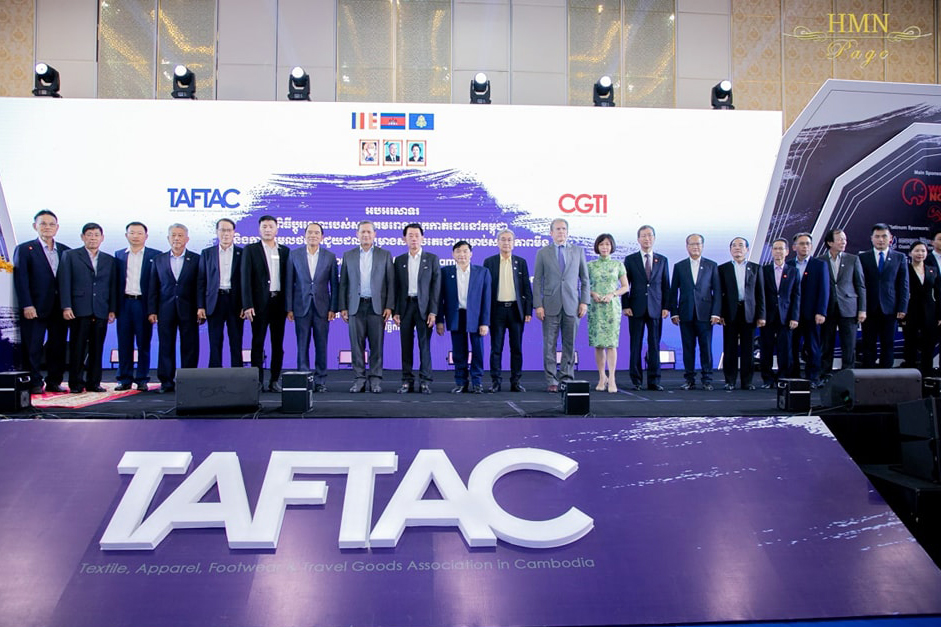
Garment Manufacturers Association in Cambodia (GMAC) officially changed its name to the “Textile, Apparel, Footwear and Travel Goods Association in Cambodia” (TAFTAC) on November 17. HUN MANET VIA FB
Garment Manufacturers Association in Cambodia (GMAC) on November 17 officially changed its name to the “Textile, Apparel, Footwear and Travel Goods Association in Cambodia” (TAFTAC) to better reflect its scope and more broadly promote exports and job creation in the textile-related sectors.
The renaming was marked by a ceremony presided over by Royal Cambodian Armed Forces deputy commander and Royal Cambodian Army commander Lieutenant General Hun Manet.
Kong Sang, who will remain on as head of TAFTAC, shared with the event that garment exports surged from $3 billion in 2008 to $6 billion in 2014 and, with the inclusion of other textile-related items subsequently put under the association’s purview, ballooned to $11 billion in 2021.
Sang confirmed that GMAC’s work and scope of representation has covered textiles, apparel, footwear, bags and travel goods since 2015. That year, a campaign was launched to encourage footwear factories to join the association, under the guidance of the Ministry of Commerce, he said.
The number of factories among the association’s ranks has increased from 400 in 2012 to the current 690, which directly employ more than 800,000 people with total annual salary of $2 billion, he said. Per-capita, this is roughly $208 a month and $2,500 a year.
Another major feat came in 2016, when GMAC along with the commerce and labour ministries successfully lobbied the US to provide duty-free access to Cambodian-made bags and travel goods, he recapped.
“After obtaining the preferential tariffs, the association and government began an investment promotion drive with a visit to Hong Kong, to attract new investors and buyers,” he said, noting that the local bag and travel goods sector has seen rapid growth in the years since.
Sang’s claims are confirmed by figures posted by the General Department of Customs and Excise, which show that the export of bags, travel goods and other items under Chapter 42 of the harmonised tariff schedule skyrocketed by 1,524.71 per cent from a mere $97.340 million in 2015 to last year’s $1.581 billion – 80 per cent or $1.26 billion of which went to the US, according to Trading Economics.
He underlined that GMAC became a member of the ASEAN Federation of Textile Industries (AFTEX) in 2002, just three years after Cambodia gained admission into the Southeast Asian bloc.
The association “continues to work tirelessly” from year to year to improve Cambodia’s competitiveness, with a focus on priorities such as employment, logistics, taxation, environment and sustainability, he said, assuring that it will keep strengthening the capacity of its secretariat to better and more comprehensively serve its members.
“With this new name, we are committed to serving our members better.”
Lieutenant General Manet said that in the quarter century since its establishment in 1996, the association has acted as the “unified voice” of investors in the textile-related sectors, promoting their rights and legitimate interests.
The association has created a forum for consultation and social dialogue open to all stakeholders on the many issues with potential bearing on the overall investment climate, with the aim of creating a favourable environment for export growth and sustainable development, he said.
He highlighted that the post-war textile, garment, footwear, bags and travel goods trades rose from humble beginnings as a small number of workers and enterprises just getting by as Cambodia began to open its economy to investment in 1993.
As of September 30, the number of registered factories in the textile-related sectors stood at 1,313, up 16.5 per cent year-on-year, he revealed.
Lieutenant General Manet echoed Sang’s sentiment on the overall efficacy of TAFTAC’s new name as a reflection of the association’s broader scope of representation.











